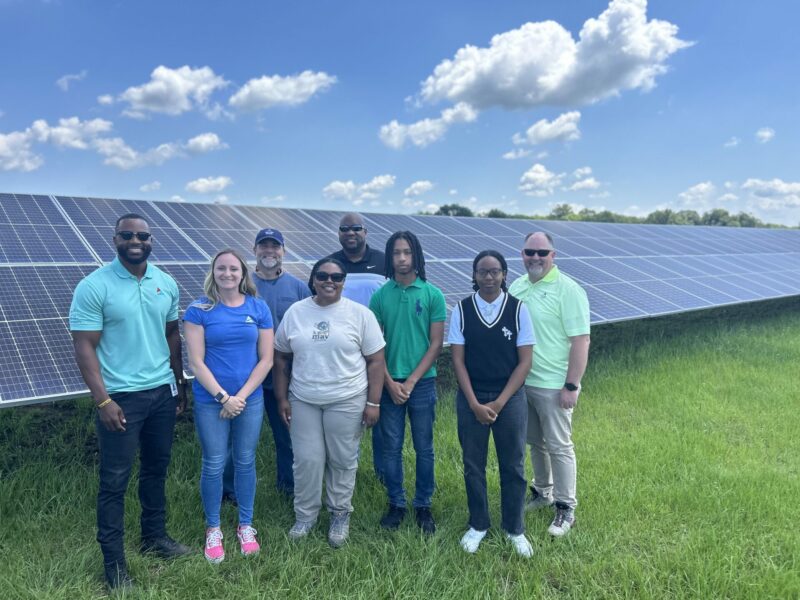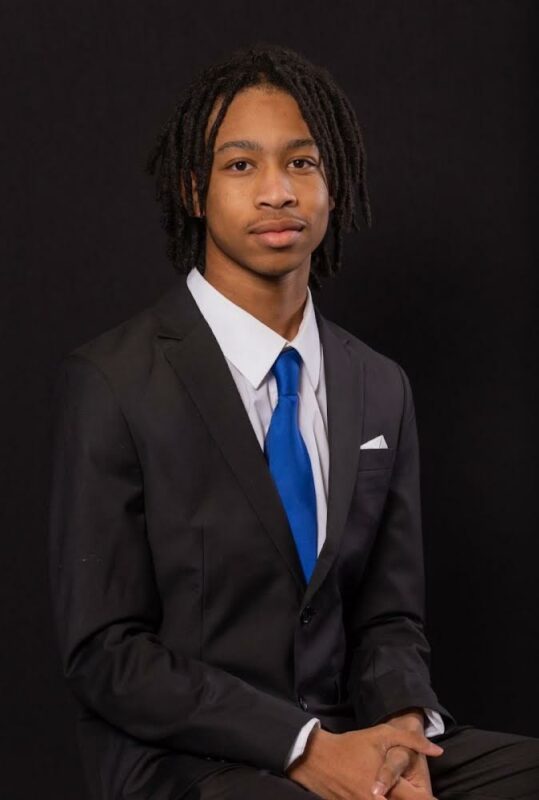This May, the Renewable Energy Wildlife Institute (REWI) kicked off the second year of the Renewable Energy Internship Program, a paid internship program supporting the U.S. Department of Energy Solar Energy Technologies Office (SETO) funded SolSource Database Project (DE-EE0010381) developed in partnership with Fort Valley State University’s (FVSU) Cooperative Developmental Energy Program (CDEP) and Colorado-based consulting firm Impulse ABT, founded by Former U.S. Fish and Wildlife Service (USFWS) Assistant Director for Science Applications and FVSU alumnus Dr. Benjamin Tuggle.
Throughout the ten-week program, two FVSU science, technology, engineering, and mathematics (STEM) students will support the development and design of the SolSource Database – a data-sharing infrastructure that will adapt to the emerging needs of solar energy and natural resource stakeholders – and learn about careers and educational opportunities in the renewable energy industry through their intern curriculum, site visits, and mentoring.
Growing Exposure to Renewable Energy Opportunities

REWI Interns and Staff with Georgia Power Staff during the 2024 Robins Solar Facility site visit.
The Renewable Energy Internship Program is a part of the Promoting Inclusive and Equitable Research Plan (PIER) for the SolSource Database Project and is intended to promote a range of diversity, equity, and inclusion (DEI)-related mentorship, training, and professional development opportunities to create more representation in STEM fields. REWI is among the first institutions to establish a PIER, with the U.S. DOE initiating PIER requirements following President Biden’s January 2021 enactment of Executive Order 14008: Tackling the Climate Crisis at Home and Abroad.
Building off the success of the 2023 inaugural internship, REWI has expanded this year’s programming to include analyses of solar development incentives and policies across different regions of the United States, researching literature on scientific research conducted at solar energy facilities, and learning about data management, in addition to site visits to Georgia Power’s Robins Solar Facility, the National Renewable Energy Laboratory (NREL), and Colorado State University’s Warner College of Natural Resources (CSU). The interns will also participate in calls with REWI’s Partners, Friends, and fellow researchers to understand their data needs, as well as gain insights into their career paths.
Meet the 2024 Interns

Ayana Lynch
FVSU students and CDEP scholars Ayana Lynch and Jared Stancil were selected as the 2024 Renewable Energy Interns. Both junior Mathematics majors, Ayana is planning to pursue graduate studies in Mechanical Engineering with a concentration in Aerospace Engineering, and Jared plans to pursue graduate studies in Mechanical Engineering and expose more young minds to STEM. Neither student had much exposure to renewable energy prior to entering the FVSU CDEP Program – which includes courses on both traditional and now renewable forms of energy. They were introduced to REWI through discussions with Dr. Benjamin Tuggle and the Annual CDEP Career Day.

Jared Stancil
When it comes to the internship program, Ayana is looking forward to visiting solar farms and learning about the different job opportunities in the renewable energy industry for mechanical engineers. Jared is excited to gain professional experience and project management skills through interactions with the SolSource Database Project Team, REWI staff, and other stakeholders. Both from the Atlanta area, Jared and Ayana will spend the summer working remotely with REWI from the FVSU campus, with onsite supervision, student support, and real-time feedback to the REWI team provided by Internship Supervisor Mr. Kenneth Leonard.
CDEP: Addressing Underrepresentation in the Energy Industry
Originally founded at Fort Valley State University, one of the top fifty historically black universities and colleges (HBCUs), in 1983 with seed money provided by U.S. Department of Energy (DOE) by Dr. Isaac J. Crumbly, CDEP has grown from an internship program exposing students of color and female students to the energy industry to now offer internships, dual degree programs, scholarships, career/job opportunities, and a Pre-College Mathematics, Science, & Engineering Academy (M-SEA), with engagement from partner universities, corporations, and government agencies.
CDEP’s expansion represents the variety of pathways needed to improve representation in the energy sector – reaching students pre-college, facilitating internships, establishing a STEM dual bachelor’s degree scholarship program with partner universities, and now offering a 3+3 dual degree program for a bachelor’s degree from FVSU and a graduate degree from a partner university. Alongside its partners, CDEP has provided over 480 STEM scholarships, 850 internships, and 450 STEM degrees.
CDEP serves as a model workforce development program introducing underrepresented students to career opportunities in the energy sector, primarily oil and gas and electric and gas utility companies. REWI applauds CDEP and Dr. Crumbly’s leadership in identifying, acknowledging, and responding to gaps in the energy workforce, and is thrilled to leverage the program’s experience and guidance to introduce underrepresented students to the renewable energy sector through the Renewable Energy Internship Program.
*The U.S. Department of Energy Solar Energy Technologies Office accelerates the advancement and deployment of solar technology in support of an equitable transition to a decarbonized economy. Learn more at energy.gov/eere/solar